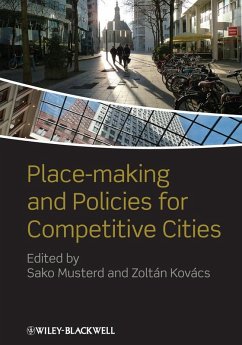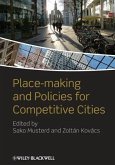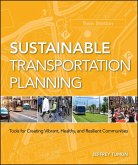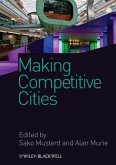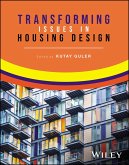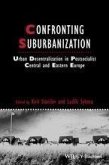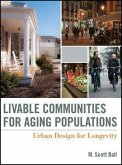Place-making and Policies for Competitive Cities (eBook, PDF)
Redaktion: Musterd, Sako; Kovacs, Zoltan


Alle Infos zum eBook verschenken

Place-making and Policies for Competitive Cities (eBook, PDF)
Redaktion: Musterd, Sako; Kovacs, Zoltan
- Format: PDF
- Merkliste
- Auf die Merkliste
- Bewerten Bewerten
- Teilen
- Produkt teilen
- Produkterinnerung
- Produkterinnerung

Hier können Sie sich einloggen

Bitte loggen Sie sich zunächst in Ihr Kundenkonto ein oder registrieren Sie sich bei bücher.de, um das eBook-Abo tolino select nutzen zu können.
Urban policy makers are increasingly striving to strengthen the economic competitiveness of their cities. Currently, they do that mainly in the field of the creative knowledge economy - arts, media, entertainment, creative business services, architecture, publishing, design; and ICT, R&D, finance, and law. This book is about the policies that help to realise such objectives: policies driven by classic location theory, cluster policies, 'creative class' policies aimed at attracting talent, as well as policies that connect to pathways, place and personal networks. The experiences and policy…mehr
- Geräte: PC
- mit Kopierschutz
- eBook Hilfe
- Größe: 17.41MB
![Place-making and Policies for Competitive Cities (eBook, ePUB) Place-making and Policies for Competitive Cities (eBook, ePUB)]() Place-making and Policies for Competitive Cities (eBook, ePUB)101,99 €
Place-making and Policies for Competitive Cities (eBook, ePUB)101,99 €![Sustainable Transportation Planning (eBook, PDF) Sustainable Transportation Planning (eBook, PDF)]() Jeffrey TumlinSustainable Transportation Planning (eBook, PDF)90,99 €
Jeffrey TumlinSustainable Transportation Planning (eBook, PDF)90,99 €![Making Competitive Cities (eBook, PDF) Making Competitive Cities (eBook, PDF)]() Making Competitive Cities (eBook, PDF)107,99 €
Making Competitive Cities (eBook, PDF)107,99 €![Transforming Issues in Housing Design (eBook, PDF) Transforming Issues in Housing Design (eBook, PDF)]() Transforming Issues in Housing Design (eBook, PDF)76,99 €
Transforming Issues in Housing Design (eBook, PDF)76,99 €![Confronting Suburbanization (eBook, PDF) Confronting Suburbanization (eBook, PDF)]() Confronting Suburbanization (eBook, PDF)20,99 €
Confronting Suburbanization (eBook, PDF)20,99 €![Livable Communities for Aging Populations (eBook, PDF) Livable Communities for Aging Populations (eBook, PDF)]() M. Scott BallLivable Communities for Aging Populations (eBook, PDF)79,99 €
M. Scott BallLivable Communities for Aging Populations (eBook, PDF)79,99 €![Retrofitting Suburbia, Updated Edition (eBook, PDF) Retrofitting Suburbia, Updated Edition (eBook, PDF)]() Ellen Dunham-JonesRetrofitting Suburbia, Updated Edition (eBook, PDF)46,99 €
Ellen Dunham-JonesRetrofitting Suburbia, Updated Edition (eBook, PDF)46,99 €-
-
-
Dieser Download kann aus rechtlichen Gründen nur mit Rechnungsadresse in A, B, BG, CY, CZ, D, DK, EW, E, FIN, F, GR, HR, H, IRL, I, LT, L, LR, M, NL, PL, P, R, S, SLO, SK ausgeliefert werden.
- Produktdetails
- Verlag: John Wiley & Sons
- Seitenzahl: 360
- Erscheinungstermin: 25. Februar 2013
- Englisch
- ISBN-13: 9781118554425
- Artikelnr.: 37756555
- Verlag: John Wiley & Sons
- Seitenzahl: 360
- Erscheinungstermin: 25. Februar 2013
- Englisch
- ISBN-13: 9781118554425
- Artikelnr.: 37756555
- Herstellerkennzeichnung Die Herstellerinformationen sind derzeit nicht verfügbar.
Foreword by Professor Allen J. Scott, University of California - Los
Angeles xv
Preface xvii
PART I INTRODUCTION 1
1 Policies and Place-making for Competitive Cities 3
Sako Musterd and Zoltán Kovács
Policy progress 3
Economic sectors 7
Questions and approaches 8
References 10
2 Prevailing Policies versus New Tailored Policies 11
Sako Musterd and Zoltán Kovács
Introduction 11
Infrastructure, communication, tax and cluster policies 14
Creative class debates and policy hypes related to
technology, tolerance and talent (3Ts) 16
New tailored policies linked to pathways, place and personal networks (3Ps)
18
Three parts 19
References 22
PART II PATHWAYS 25
3 Policies Built upon Pathways 27
Sako Musterd and Zoltán Kovács
Pathways and urban development 27
Capitalising on layers of development 30
Power centres with sustained positions 31
Post-socialist policies and the struggle with the past 32
References 33
4 Policies towards Multi-Layered Cities and Cluster Development 35
Tamás Egedy, Anne von Streit and Marco Bontje
Introduction 35
Multi-layered cities 37
Path dependence of cluster development and the role of policies 39
Multi-layered cities in Western Europe and in Eastern and Central Europe 43
Conclusions 54
References 55
5 Capitalising on Position: Policies for Competitive Capital and
non-Capital Cities 59
Julie Brown, Declan Redmond and Marc Pradel i Miquel
Introduction 60
The function of capital versus non-capital cities 61
Selected capital and non-capital cities in the ACRE study 63
Capital cities: development pathways and policies 64
Development pathways of non-capital cities 67
Policies for competitive non-capital cities 69
Conclusions 72
References 74
6 Addressing the Legacy of Post-Socialist Cities in East Central Europe 77
Tadeusz Stryjakiewicz, Olga Gritsai, Evgenii Dainov and Tamás Egedy
Introduction 78
Key features of post-socialist cities affecting urban policies 79
The role and structure of the creative and knowledge-intensive sectors 81
Challenges and policy responses 84
Policy recommendations 90
Concluding remarks 92
References 93
PART III PLACE 95
7 The Importance of Places and Place Branding 97
Zoltán Kovács and Sako Musterd
Introduction 97
Sense of place and placelessness 98
Place-making, place marketing and place branding 100
Shifting focus of place-making in competitive cities 101
References 103
8 Policies towards Place Attraction and Policies for Place Retention 105
Philip Lawton, Micha³ Mêczyñski and Austin Barber
Introduction: place-making and the creative knowledge economy 106
The evolution of 'place-making' 107
Developing policies oriented towards the retention of creative and
knowledge workers 114
Policy reorientation: a focus on place retention 115
Conclusion: place-making policy formation 122
References 123
9 Urban Regeneration and Housing as Potential Tools for Enhancing the
Creative Economy 127
Tamás Egedy, Declan Redmond and Kornelia Ehrlich
Introduction 128
Links between urban regeneration and the creative economy 129
Housing for everyone and housing for creative people 132
How can regeneration and housing support the creative economy? 135
Conclusions 144
References 145
10 Successes and Failures in City Branding Policies 149
Montserrat Pareja-Eastaway, Caroline Chapain and Silvia Mugnano
Introduction 149
Theories on place branding: the role played by cultural and creative
industries 152
Some empirical evidence 154
Conclusions: evaluating city branding processes 166
Acknowledgements 169
References 169
11 Policies for Small and Large Cities 173
Marc Pradel i Miquel, Anders Paalzow and Hélène Martin-Brelot
Introduction 173
City size and the creative knowledge economy 174
Does size influence the decisions of skilled employees in the creative and
knowledge economy? 178
City size, governance and policy-making 183
Conclusion: different dimensions, different challenges 186
References 189
12 Creative Knowledge Strategies for Polycentric City-Regions 191
Marco Bontje and Kaisa Kepsu
Introduction 191
The city-region concept 193
From mono- to polycentric city-regions 195
Geographies of creative knowledge companies 197
Geographies of creative knowledge workers 200
Towards competitive creative knowledge regions? Examples of city-regional
collaboration 202
Conclusions and policy implications: the added value of city-regional
collaboration 205
References 206
PART IV PERSONAL NETWORKS 209
13 Personal Networks 211
Zoltán Kovács and Sako Musterd
The personal touch 211
From networks of firms to networks of people: the role of personal networks
in the creative knowledge economy 212
Possible policy interventions focusing on personal networks 215
References 218
14 Networks and Mobility: the Policy Context 219
Olga Gritsai, Michel Grossetti and Denis Eckert
Introduction 219
The importance of personal trajectories and personal networks 222
Cultural and institutional constraints on mobility 227
Challenges for policy-makers 229
Conclusions 235
References 236
15 Internationalisation and Policies towards Transnational Migration 239
Heike Pethe and Sabine Hafner
Transnational migration of the highly skilled 239
Transnational migration of highly skilled professionals 241
Identifying and monitoring target groups for effective policies 243
Developing effective measures for highly skilled migrants - good practices
255
Conclusions 258
References 259
16 Policies Aimed at Strengthening Ties between Universities and Cities 263
Krzysztof Stachowiak, Rómulo Pinheiro, Carla Sedini and Mari Vaattovaara
Introduction 263
The changing nature of university-city relations 265
From university in, to the university of or for, the city: tensions and
dilemmas in university-city relations 266
The university as an enabler of the creative economy 274
Case studies 277
Challenges and bottlenecks surrounding university-city relations 282
Conclusions 284
Acknowledgements 286
References 286
17 Governance of Creative Industries: the Role of Social and Professional
Networks 293
Anne von Streit and Bastian Lange
Introduction 293
The creative industries: definitions and characteristics 295
Important strands of policies 297
Governance of the creative industries 299
Networks in the creative industries: theoretical approaches and empirical
findings 302
Examples of promoting networks in the creative industries 304
Conclusions and suggestions 308
References 309
PART V CONCLUSIONS 313
18 Tailored - Context-Sensitive - Urban Policies for Creative Knowledge
Cities 315
Sako Musterd and Zoltán Kovács
Three building blocks for new urban economic policies 315
New urban policies put in context: 'PPP-CC-T' 318
Building on the past? 319
Tailored policies to create smart places 321
Policies building on personal networks 323
Conclusions 325
References 326
Index 329
Foreword by Professor Allen J. Scott, University of California - Los
Angeles xv
Preface xvii
PART I INTRODUCTION 1
1 Policies and Place-making for Competitive Cities 3
Sako Musterd and Zoltán Kovács
Policy progress 3
Economic sectors 7
Questions and approaches 8
References 10
2 Prevailing Policies versus New Tailored Policies 11
Sako Musterd and Zoltán Kovács
Introduction 11
Infrastructure, communication, tax and cluster policies 14
Creative class debates and policy hypes related to
technology, tolerance and talent (3Ts) 16
New tailored policies linked to pathways, place and personal networks (3Ps)
18
Three parts 19
References 22
PART II PATHWAYS 25
3 Policies Built upon Pathways 27
Sako Musterd and Zoltán Kovács
Pathways and urban development 27
Capitalising on layers of development 30
Power centres with sustained positions 31
Post-socialist policies and the struggle with the past 32
References 33
4 Policies towards Multi-Layered Cities and Cluster Development 35
Tamás Egedy, Anne von Streit and Marco Bontje
Introduction 35
Multi-layered cities 37
Path dependence of cluster development and the role of policies 39
Multi-layered cities in Western Europe and in Eastern and Central Europe 43
Conclusions 54
References 55
5 Capitalising on Position: Policies for Competitive Capital and
non-Capital Cities 59
Julie Brown, Declan Redmond and Marc Pradel i Miquel
Introduction 60
The function of capital versus non-capital cities 61
Selected capital and non-capital cities in the ACRE study 63
Capital cities: development pathways and policies 64
Development pathways of non-capital cities 67
Policies for competitive non-capital cities 69
Conclusions 72
References 74
6 Addressing the Legacy of Post-Socialist Cities in East Central Europe 77
Tadeusz Stryjakiewicz, Olga Gritsai, Evgenii Dainov and Tamás Egedy
Introduction 78
Key features of post-socialist cities affecting urban policies 79
The role and structure of the creative and knowledge-intensive sectors 81
Challenges and policy responses 84
Policy recommendations 90
Concluding remarks 92
References 93
PART III PLACE 95
7 The Importance of Places and Place Branding 97
Zoltán Kovács and Sako Musterd
Introduction 97
Sense of place and placelessness 98
Place-making, place marketing and place branding 100
Shifting focus of place-making in competitive cities 101
References 103
8 Policies towards Place Attraction and Policies for Place Retention 105
Philip Lawton, Micha³ Mêczyñski and Austin Barber
Introduction: place-making and the creative knowledge economy 106
The evolution of 'place-making' 107
Developing policies oriented towards the retention of creative and
knowledge workers 114
Policy reorientation: a focus on place retention 115
Conclusion: place-making policy formation 122
References 123
9 Urban Regeneration and Housing as Potential Tools for Enhancing the
Creative Economy 127
Tamás Egedy, Declan Redmond and Kornelia Ehrlich
Introduction 128
Links between urban regeneration and the creative economy 129
Housing for everyone and housing for creative people 132
How can regeneration and housing support the creative economy? 135
Conclusions 144
References 145
10 Successes and Failures in City Branding Policies 149
Montserrat Pareja-Eastaway, Caroline Chapain and Silvia Mugnano
Introduction 149
Theories on place branding: the role played by cultural and creative
industries 152
Some empirical evidence 154
Conclusions: evaluating city branding processes 166
Acknowledgements 169
References 169
11 Policies for Small and Large Cities 173
Marc Pradel i Miquel, Anders Paalzow and Hélène Martin-Brelot
Introduction 173
City size and the creative knowledge economy 174
Does size influence the decisions of skilled employees in the creative and
knowledge economy? 178
City size, governance and policy-making 183
Conclusion: different dimensions, different challenges 186
References 189
12 Creative Knowledge Strategies for Polycentric City-Regions 191
Marco Bontje and Kaisa Kepsu
Introduction 191
The city-region concept 193
From mono- to polycentric city-regions 195
Geographies of creative knowledge companies 197
Geographies of creative knowledge workers 200
Towards competitive creative knowledge regions? Examples of city-regional
collaboration 202
Conclusions and policy implications: the added value of city-regional
collaboration 205
References 206
PART IV PERSONAL NETWORKS 209
13 Personal Networks 211
Zoltán Kovács and Sako Musterd
The personal touch 211
From networks of firms to networks of people: the role of personal networks
in the creative knowledge economy 212
Possible policy interventions focusing on personal networks 215
References 218
14 Networks and Mobility: the Policy Context 219
Olga Gritsai, Michel Grossetti and Denis Eckert
Introduction 219
The importance of personal trajectories and personal networks 222
Cultural and institutional constraints on mobility 227
Challenges for policy-makers 229
Conclusions 235
References 236
15 Internationalisation and Policies towards Transnational Migration 239
Heike Pethe and Sabine Hafner
Transnational migration of the highly skilled 239
Transnational migration of highly skilled professionals 241
Identifying and monitoring target groups for effective policies 243
Developing effective measures for highly skilled migrants - good practices
255
Conclusions 258
References 259
16 Policies Aimed at Strengthening Ties between Universities and Cities 263
Krzysztof Stachowiak, Rómulo Pinheiro, Carla Sedini and Mari Vaattovaara
Introduction 263
The changing nature of university-city relations 265
From university in, to the university of or for, the city: tensions and
dilemmas in university-city relations 266
The university as an enabler of the creative economy 274
Case studies 277
Challenges and bottlenecks surrounding university-city relations 282
Conclusions 284
Acknowledgements 286
References 286
17 Governance of Creative Industries: the Role of Social and Professional
Networks 293
Anne von Streit and Bastian Lange
Introduction 293
The creative industries: definitions and characteristics 295
Important strands of policies 297
Governance of the creative industries 299
Networks in the creative industries: theoretical approaches and empirical
findings 302
Examples of promoting networks in the creative industries 304
Conclusions and suggestions 308
References 309
PART V CONCLUSIONS 313
18 Tailored - Context-Sensitive - Urban Policies for Creative Knowledge
Cities 315
Sako Musterd and Zoltán Kovács
Three building blocks for new urban economic policies 315
New urban policies put in context: 'PPP-CC-T' 318
Building on the past? 319
Tailored policies to create smart places 321
Policies building on personal networks 323
Conclusions 325
References 326
Index 329
